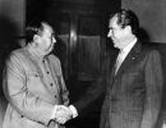
The Unknown Story
Jung Chang and Jon Halliday
Vintage Books 2006
This book does not lay claim to be an academic thesis, and in places it suffers from unnecessary repetition, a lack of balanced perspective, and non-acknowledgement of sources. However, even if a fraction of what it presents bears truth, it is a terrible indictment of a man who many consider to be a giant of the twentieth century.
What emerges is a portrait not of a benevolent leader but of a gangster, without principles, morals, or even the traditional Chinese concept of conscience (liang-xin). As Mao once stated, “We indeed have no conscience!” The authors present us with an arch manipulator, fornicator, and liar, who sought power only for himself and used anybody or anything – including Marxist ideology, opium, the Japanese army, and family – to achieve his ends.
Millions were sent to their deaths in purges, and millions died of starvation through lunatic economic policies and grandiose schemes that even the most debauched Roman or Chinese Emperor would be hard pressed to come close to.
The authors assert that Mao’s most formidable weapon was his pitilessness. He used torture, deception, propaganda, blackmail, indoctrination, and mass terror on an unprecedented scale, even by comparison with Stalin or Hitler.
In his own estimation, all existed to serve Mao and only Mao, the great helmsman who longed to rule the planet from one of his numerous bunker-palaces scattered around China. He stated, “Of course there are people and objects in the world, but they are all there only for me. People like me have only a duty to ourselves; we have no duty to other people”. And, “… When Great Heroes give full play to their impulses, they are magnificently powerful, stormy and invincible. Their power is like a hurricane arising from a deep gorge, and like a sex-maniac on heat and prowling for a lover … there is no way to stop them.”
Those who tried to oppose him were driven insane, exiled or murdered. He unscrupulously manipulated and misused the idealism of the Chinese youth in the so-called “cultural revolution”, directed by the notorious Gang of Four (Mme Mao, Yao Wen-yuan, Zhang Chun-qiao, Wang Hong-wen). His fourth and last wife, the hysterical and isolated Jiang Qing stated, “I was Chairman Mao’s dog. Whoever Chairman Mao asked me to bite, I bit.” She committed suicide in 1991.
Mao charmed Stalin, Richard Nixon and numerous others. Edgar Snow glamorised him in Red Star Over China. The gullible Field Marshal Montgomery, who visited China in the early 1960s, declared that there was no large-scale famine and touted Mao’s rule, saying “China needs the Chairman”. Jean-Paul Sartre praised his ‘revolutionary violence’ as being ‘profoundly moral’.
It is easy upon the reading of this book to dismiss Mao Tse-tung as a voyeuristic and cowardly criminal. But to read of a life so overtaken by such impulses leads us to question our own: from where arises such lust for destruction, and what draws others to slavishly follow?
In 1918, at the age of twenty-four, Mao wrote that in order to effect change everything must be destroyed. “This applies to the country, to the nation, and to mankind … The destruction of the universe is the same … People like me long for its destruction, because when the old universe is destroyed, a new universe will be formed. Isn’t that better!”
This disturbing book has lifted veils and exposed many falsehoods that covered Mao and the Communist party of China, and makes Orwell’s Animal Farm seem like a petting zoo.